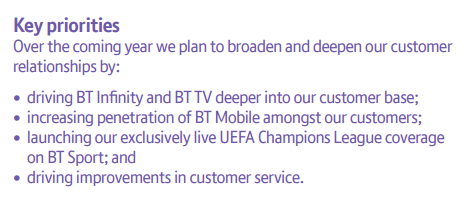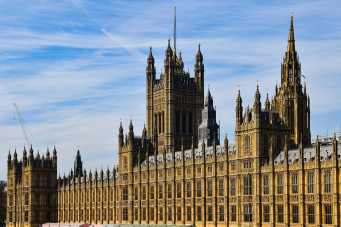
Sky vs BT: who’s winning UK TV’s heavyweight fight?
Sky and BT, two of the biggest players in Britain’s competitive pay-TV market, are slugging it out for customers.
But who’s winning? Is BT’s huge spending on sport and drama having any serious impact on Sky’s dominance?
Sixty-one per cent of UK households currently take a pay-TV service but with smartphones and online services becoming ever-more prevalent in our personal and professional lives, the provision of broadband – BT’s core business – is clearly central to future profits.
The pair’s rivalry has intensified recently after large numbers of BT’s broadband customers moved to Sky not only for that particular product but also to take advantage of Sky’s superior TV content. Sky still dominates but BT TV, the rebranded version of the underperforming BT Vision, now boasts some big names as well as expensive programming.
But will BT’s strategy work? Or has the latest challenger to Sky’s dominance simply arrived at the party too late? We look at how things stand.
Sport
Sky claims to be “the home of the Barclays Premier League”, having paid £4.176 billion to retain the lion’s share of matches – 126 – in the new three-year deal. That figure – almost double the amount paid for the same number of matches less than three years ago – bought Sky five of the seven available packages.
BT picked up the remaining packages (42 games) at a cost of £960 million. But their current marketing shouts that BT is “the only place to watch all the UEFA Champions League live”, after it paid almost £900m for exclusive rights to show the continent’s premier football club competition (as well as the Europa League) for three seasons, shelling out more than double the £400m Sky and ITV paid for shared rights for the previous three years.
That’s nearly £2 billion spent on football alone by BT.
But the company’s investment in sports programming takes them beyond football and into rugby union, Moto GP and international cricket, now that they have the rights to Ashes Tests played in Australia.
Drama
Clearly those huge outlays for sports competitions grab headlines but BT’s recent tie-up with AMC, the American studio behind hit dramas such as Mad Men and Breaking Bad, signals an intention to capture a broader market.
“Half of UK homes are choosing to buy their broadband bundled with TV services and sport is a particularly strong driver for a number of those homes. Drama and entertainment equally have broad appeal,” says BT TV and Sport managing director Delia Bushell.
When the first episode of Fear the Walking Dead aired recently on BT’s free-to-air Showcase channel (subsequent episodes will go out on the AMC channel), it struggled to compete with the original story, The Walking Dead, the second half of series five of which launched on Fox, which is also available on Sky and Virgin Media, earlier this year.
Just under 300,000 viewers watched Fear the Walking Dead in the first 48 hours, a figure that’s unlikely to worry Sky, who have begun to show original big-budget dramas commissioned exclusively for its channels, such as Fortitude and The Last Panthers, which airs in November. BT has no plans to commission its own content, even though AMC is an attempt to match Sky Atlantic, which shows a mixture of commissioned, co-produced and acquired films.
Mobile tie-ups
Both BT and Sky have also entered the mobile market, becoming what are known as ‘quad players’, meaning they’ll be able to bundle four services – home phone, mobile, TV and broadband – together in a single package for customers.
BT announced a proposed £12.5 billion takeover of the UK’s largest mobile operator, EE, at the end of last year, while Sky is in the process of launching its own mobile service using O2’s network.
The state of play
With more money to spend – and lose – in the UK market, BT differs from previous challengers to Sky’s dominance, such as Setanta and ESPN.
While BT have 1.2 million customers compared to Sky’s 12 million, BT is clearly intent on challenging their competitor’s dominance – and attracting customers again – with a serious spending spree.
But Sky’s resilience, huge customer numbers and very deep pockets of their own – which they’re quite prepared to dip into – indicate their own commitment to remaining as the UK’s main pay-TV player.
There’s no doubt that BT finds Sky’s dominance hard to compete with. Even with deep pockets, the fact that others have tried and failed tells its own story.
Between them, Sky and BT will spend more, from 2016, to televise one season of Premier League football than the BBC spends annually on all its hours of TV programming. And you can confidently expect Sky and BT’s combined spend to go in one direction while the BBC’s annual budget moves in the other.
BT’s priorities, according to the company’s latest annual report:

Read our blog the easy way. Enter your name and email address in the form at the bottom of every page on our website and get an email every time we publish.

Netflix, Paramount and Warner Bros.: What the Deal Means for the Broadcast and Production Industry

How the Employment Rights Act 2025 Is Reshaping the Freelance Market
